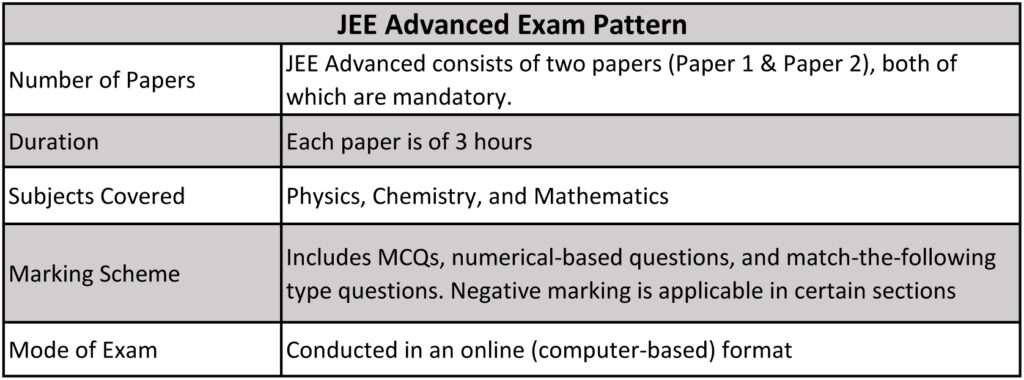
JEE Advanced is one of the most challenging entrance exams in India, serving as the gateway to prestigious IITs. Unlike JEE Mains, JEE Advanced tests students’ problem-solving skills, in-depth understanding, and ability to apply concepts. Cracking this exam requires not just hard work but also a well-structured strategy.
For aspirants thinking about how to prepare for JEE Advanced and secure a top rank in this competitive exam, this guide will help in understanding the best techniques for preparation, exam-day strategies and study materials to maximize performance in the exam.
Contents
Before diving into preparation, it is essential to understand the exam pattern. Understanding the pattern of the exam helps in strategizing time management and question-solving techniques.

JEE Advanced eligibility requirements 2026:

The syllabus for JEE Advanced is extensive and slightly different from JEE Mains. Here’s a subject-wise breakdown:
Physics
Mechanics (Newton’s Laws, Work & Energy, Rotational Motion)
Electrodynamics (Current, Magnetism, Capacitors, EM Waves)
Modern Physics (Atomic Structure, Photoelectric Effect, Semiconductor)
Chemistry
Physical Chemistry (Thermodynamics, Chemical Kinetics, Equilibrium)
Inorganic Chemistry (Coordination Compounds, P-Block, D-Block Elements)
Organic Chemistry (Reaction Mechanisms, Polymers, Biomolecules)
Mathematics
Algebra (Complex Numbers, Probability, Matrices & Determinants)
Calculus (Limits, Differentiation, Integration, Differential Equations)
Coordinate Geometry (Circles, Parabola, Ellipse, Hyperbola)
For candidates thinking about how to prepare for JEE Advanced they should start with a well-structured study plan as it ensures efficient preparation. Follow these steps:
Set Daily & Weekly Goals: Allocate dedicated time for each subject and topic for smooth flow of preparation of all subjects.
Balance School & Coaching: Taking coaching classes along with school can become hectic, aspirants should ensure consistency without overburdening yourself.
Revise Regularly: Revision of previously covered topics is important to reinforce concepts.
Take Mock Tests: Taking mock tests on regular basis will help in identifying areas of weakness and make necessary improvements.
Stay Consistent: Once the candidate has prepared a plan following it diligently and avoiding distractions is important.
Choosing the right books is crucial for preparation. Here are expert-recommended books:
Physics
Concepts of Physics by H.C. Verma
Understanding Physics by D.C. Pandey
Problems in General Physics by I.E. Irodov
Chemistry
Physical Chemistry by P. Bahadur
Inorganic Chemistry by J.D. Lee
Organic Chemistry by Morrison & Boyd
Mathematics
Cengage Series for Mathematics
IIT Mathematics by M.L. Khanna
Problems in Calculus of One Variable by I.A. Maron
No, NCERT is generally not sufficient for JEE Advanced preparation alone. While it provides a strong foundation in fundamental concepts, JEE Advanced requires a deeper understanding and application of these concepts, in which case NCERT sufficiency for JEE Advanced is not enough.
To develop deeper understanding aspirants apart from using NCERT books as foundation for JEE Advanced preparation have to refer additional resources in the form of reference books.
Preparing for JEE Advanced is a marathon, not a sprint. The time required varies based on several factors, but having a realistic timeframe helps aspirants create an effective preparation strategy.
Recommended Preparation Timeframes:
Long-Term Preparation (Ideal Scenario):
Medium-Term Preparation:
Short-Term Preparation:
Time Distribution Factors:
Your required preparation time depends on:
Recommended Daily Time Investment:

Quality vs. Quantity:
The key factor isn’t just the total hours invested by the students but the quality of hours put into the preparation. Two hours of focused, active learning is far more valuable than five hours of passive reading or distracted study.
The period between JEE Mains and Advanced (typically 1-2 months) is critical and must be utilized strategically. Here’s a comprehensive JEE Advanced specific preparation techniques & plan to maximize this limited time:
Week-by-Week Strategic Plan:
Weeks 1-2: Gap Analysis & Foundation Strengthening
Weeks 3-4: Advanced Problem Solving
Weeks 5-6: Mock Tests & Strategic Refinement
Essential Activities During This Period:
Aspirants must remember that JEE Advanced focuses more on testing conceptual understanding of aspirants and analytical thinking rather than just problem-solving speed so aspirants must focus on analytical thinking development for JEE Advanced.
Beginning JEE Advanced preparation from Class 11 provides an advantage of time and allows for deeper conceptual understanding. Here’s a structured approach:
Phase 1: Foundation Building (First 6 Months of Class 11)
Academic Focus:
Study Habits:
Phase 2: Expansion (Latter Half of Class 11)
Academic Development:
Strategic Elements:
Phase 3: Acceleration (First Half of Class 12)
Academic Progression:
Testing Strategy:
Phase 4: Mastery (Final Phase of Class 12)
Academic Refinement:
Psychological Preparation:
Subject-wise Approach from Class 11:
Mathematics:
Physics:
Chemistry:
Preparing for JEE Advanced in just 3 months requires intense focus, strategic planning, and exceptional discipline. While challenging, a well-structured approach can help maximize your potential.
Week-by-Week Preparation Plan:
Week 1: Strategic Planning and Diagnostic
Weeks 2-4: Foundation Reinforcement
Weeks 5-8: Advanced Problem Solving
Weeks 9-12: Mock Tests and Refinement
Subject-wise Priority Topics (80-20 Rule):
Physics:
Chemistry:
Mathematics:
Realistic Expectations:
A 3-month preparation period is challenging, and it’s important to set realistic goals:
Students must remember that consistency is more important than occasional intense study sessions. Even with just 3 months, a structured approach focusing on high-yield topics and regular testing can help maximize your potential.
Strategic approach to IIT entrance preparation is necessary for aspirants. To crack JEE Advanced, adopt the following strategies for systematic preparation methodology for JEE Advanced:
1. Conceptual Clarity Over Memorization
Focus on understanding the concepts rather than rote learning. Apply concepts to real-life problems for better retention.
2. Solve Previous Years’ Papers
Solving previous years question papers helps in understanding the patterns of question and improves problem-solving speed and accuracy of candidates.
3. Regular Mock Tests & Self-Assessment
Mock tests simulates real exam conditions which makes them exam ready and helps aspirants identify their strengths and weak areas for improvement.
4. Effective Time Management
Effective management of time is important to attempt as many question as possible. Allocate time wisely for each section without getting stuck on one question—move forward and return later.
5. Improve Problem-Solving Speed
Practice shortcut techniques for lengthy calculations also learning alternative methods to solve complex questions is important.
How many attempts for JEE Mains
JEE Advanced is a time-bound exam, and proper time management can make a significant difference. Aspirants can follow the below mentioned result oriented preparation strategies-
Time Management Tips
Daily Schedule: Aspirants should allocate 6-8 hours daily for their preparation, including 2-3 hours of practice questions.
80/20 Rule: 80% of time should be devoted towards high-weightage topics and 20% towards weak areas.
Avoid Distractions: Staying away from social media and any form of distractions while studying is necessary.
Solve Questions in controlled environment: Mock tests are of great importance for JEE Advanced as this develops question pattern familiarization, improve speed, performance tracking, analysis and take necessary steps for improvement. Also aspirants can have real exam experience via mock tests.
Effective Revision Techniques
Short Notes & Mind Maps: Write down key formulas, concepts, and important tricks in a concise manner which can be greatly helpful for last minute revision.
Solve Questions Daily: Practice solving problems regularly to improve accuracy and boost confidence.
Revise Weak Topics Daily: Extra time should be devoted topics which are considered weak by the aspirant
Flashcards for Quick Recall: Flashcards can be greatly helpful in memorizing formulas and important concepts.
Certain topics can be tricky. Here’s how to tackle them:
Physics: Solve conceptual problems rather than direct formulas.
Chemistry: Focus on reaction mechanisms and periodic trends.
Mathematics: Master coordinate geometry and calculus through practice.
Tip: Identify weak areas early and dedicate extra time to mastering them.
Pros of Coaching Institutes
Structured guidance and doubt-clearing sessions.
Access to expert faculty and competitive environment.
Pros of Self-Study
Flexible study hours.
Allows personalized learning based on strengths and weaknesses.
A combination of both coaching and self-study is ideal for JEE Advanced preparation.
Practicing mock tests and previous year papers is essential:
Improves familiarity with exam pattern.
Enhances time management skills.
Helps in analyzing performance and improving weak areas.
Recommended Practice Routine:
Solve at least 2 full-length tests weekly.
Review mistakes and understand the correct approach.
In last 3 months to 6 months focus on the following factors:

On exam day, follow these tips:
Read Questions Carefully: Avoid misinterpretation.
Manage Time Wisely: Don’t spend too long on one question.
Stay Calm & Focused: Anxiety can impact performance.
Attempt Easy Questions First: Secure sure-shot marks before tackling difficult ones.
Candidates thinking about how to prepare for JEE Advanced must understand that cracking JEE Advanced requires dedication, perseverance, and smart preparation. By following a structured study plan, using the right resources, and practicing consistently, aspirants can maximize their chances of success. Also candidates must keep themselves updated with by following National Testing Agency (NTA) website. Remember, persistence is key—stay focused, work hard, and believe in yourself.
The JEE Advanced exam has 108 questions, with 54 questions in each paper.
To qualify for the JEE Advanced exam in 2025, you need to score at least: 35% for the general category, 31.5% for OBC-NCL/EWS, and 17.5% for SC/ST/PwD candidates.
The number of attempts for the Joint Entrance Examination (JEE) Advanced is limited to two attempts in two consecutive years. This is the revised limit for 2025.